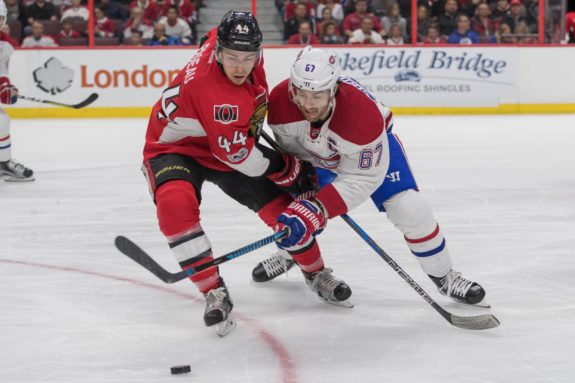Among the 16 teams privileged enough to be playing in the 2017 Stanley Cup Playoffs, is there any that has received less play in the media than the Ottawa Senators?
For a team that finished second in the Atlantic Division, managing a number of potentially devastating injuries in the process, seemingly no one is giving the Sens a shot in their first-round series with the Boston Bruins. This, despite sweeping the season series with Boston, limiting them to just one even-strength goal in four games.
Still, the folks at theScore, NHL.com and even here at The Hockey Writers, among many other publications, are heavily favouring the Bs in the series. But no matter what the consensus from the experts and armchair GMs may be, the Sens should by no means be the underdog in this series, largely thanks to the strength of their team defence.
The Process
When Guy Boucher took over this season, the task he was handed was a daunting one – how do you take one of the league’s worst defensive teams (the Senators allowed 241 goals last season, fifth-worst in the league) and turn it into a playoff contender with virtually the same core of players? The answer was apparently as simple as convincing his team to adopt a more conservative style of play, contrary to their more typical risk-taking style.
His team obliged and the results have been undeniable and obvious at both ends of the ice: Ottawa finished as a top-10 team in goals against, allowing 210 (or 2.56 per game), but saw its scoring drop from 230 goals last season (9th overall) to just 206 this season. That figure ranked 22nd in the league and worst among playoff teams, a full 13 goals behind the San Jose Sharks.
Even with a negative goal differential (the only playoff team able to lay claim to that distinction), the Senators found a way to make it work in the standings – they went from 38-35-9 (11th in the east) a year ago, to 44-28-10 and sixth in the conference. While the defencemen had an important role to play in Boucher’s new system, the contributions of the forwards can’t be overlooked.

One of the Senators’ biggest problems in the last four years was trying to find a healthy medium between carrying the play and applying pressure offensively while playing responsible defensively. Under Paul MacLean and Dave Cameron, the former was never a problem but it often came at the expense of the latter.
Under Boucher, though, Ottawa has four 50-point producers and three 20-goal scorers but has been able to weave that into a system that preaches defence first. That fact is no more evident than in the team’s plus-minus – only three players in the top-10 in scoring finished with a minus rating, including Ottawa’s second-leading point scorer Mike Hoffman, who finished with a team-best plus-17 rating.
Building From the Back
Of course, the Senators wouldn’t be in this position without a deep blue line able to shoulder the responsibility of playing in Boucher’s system. Leading the charge on that front, despite playing fewer than 82 games for the first time in four seasons, was Erik Karlsson – but he did so in a way the average fan wouldn’t expect.
Karlsson set the perfect example for his teammates (forwards and defencemen) when he took on a much more pronounced defensive role. He played the most shorthanded minutes of his career (165:37), blocked the second-most shots in the league at 201, finished with a plus-10 rating and still found a way, amidst all that defensive focus, to pick up 71 points in 77 games.
The effects of Karlsson’s stylistic change were palpable – Cody Ceci and Chris Wideman, who typically carry the offence on their respective pairings, finished with the most blocks of their careers. In Ceci’s case that came at the expense of some of his output (he had the second fewest points of any season of his career), but Wideman was still able to record a career-high in points.
Overall, Ottawa’s defencemen (including call-ups) combined for 161 points, a plus-eight rating and helped Ottawa to the third-highest blocked shot total in the league with 1,352. What was especially important, as just alluded to, was the Sens were able to plug their call-ups into the lineup seamlessly – in particular, late in the season as the health of their regulars took a hit.
With Karlsson, Ceci and Marc Methot each missing time for various injuries in the final weeks, the play of Fredrik Claesson, Ben Harpur and Jyrki Jokipakka was of particular importance in clinching a playoff berth. Harpur averaged the most ice time of that trio with 17:48 in six games, while Jokipakka and Claesson averaged 14:27 and 13:08 respectively.
Defence Wins Championships
The Senators are one of the best defensive teams in the league, but the Bruins are no slouches either. They finished just ahead of the Sens in goals against, allowing one fewer, had eight shutouts to Ottawa’s 10, and Tuukka Rask (.915 save percentage) finished 11 percentage points behind Craig Anderson’s .926 mark.
Boston’s offence, meanwhile, was much better than Ottawa’s (232 goals to just 206), but still ranked outside the top-10. So with the way each team plays defence, this series could come down to last goal wins.